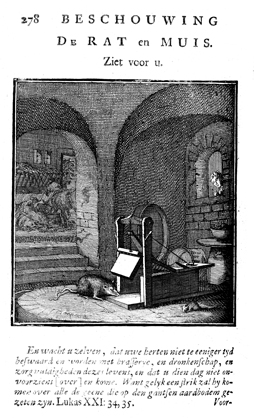The Rat and Mouse: Look in Front of Thee
Author: Luiken, Jan, 1649-1712
Image Title: The Rat and Mouse: Look in Front of Thee
Scripture Reference:
- Luke 21 (further images / scripture text)
Description: On the right a young man watches through the window of a cellar where a large rat is about to enter a trap that has been set. A mouse is crouched at the side of the trap. In the background, on an upper level, a man feeds cows that are stabled there. The Dutch artist and poet Jan Luiken (1649–1712) was responsible for drawing this emblem and composed the poem that accompanies it. The etching was executed by Jan Luiken or his son Casper Luiken (1672–1708) who adapted this image from one used in an earlier work, which may be found in the Digital Image Archive under the call number 1699Weig. The attendant scripture text is Luke 21:34-35.
Motto: Caution, Here it is thy time.
Poem:
The open door, that greets thee,
With sweet smells of the freshly roasted,
To satisfy thy hunger,
Seems open and free and without harm:
But if thou knewest the threatening danger,
Thou wouldst not play around it,
Gradually closer, here and there,
To finally partake of the plunder.
But avoidance, would be thy best choice,
And distance thy best protection;
Speed should hasten itself from that Door,
As from the gaping grave of death.
Deception, with a watchful eye
Is certainly hidden from thy view
And thrusts its finger dismally upward,
In the hope of thy miserable wandering.
If thou dost come too close, there falls a bang,
That all of a sudden makes thee tremble;
Recognized too late, it bears woe and alas,
Captured is the free life.
O Man! who views this contraption,
And even arranges it with thy hands,
Dost thou not learn from this example,
To keep thyself free from bonds!
Is this world’s vale of tears,
Extended with a sensuous scent
Not a treacherous trap,
Which so many overlooked?
What brings the downfall of death,
Is the life that lets itself be tempted,
Not unpredictable in fear and distress,
Yet it did not try to avoid the danger!
He who finds himself still free,
Should shun such evil dangers,
Where desire surrounds a little bait,
Before he is cut off from the escape.
O freedom of a large conscience,
May one be satisfied with less to eat,
So that we may endlessly possess,
Thy pleasant sweetness.
(Translation by Josephine V. Brown, with editorial assistance from William G. Stryker)
.
Click here for additional images available from this book.
Request a high-resolution file (fees apply)
Rights Statement: The online edition of this work in the public domain, i.e., not protected by copyright, has been produced by Pitts Theology Library, Emory University.
Rights Status: No Copyright - United States
Pitts Theology Library provides copyright information as a courtesy and makes no representation about copyright or other legal status of materials in the Digital Image Archive.

